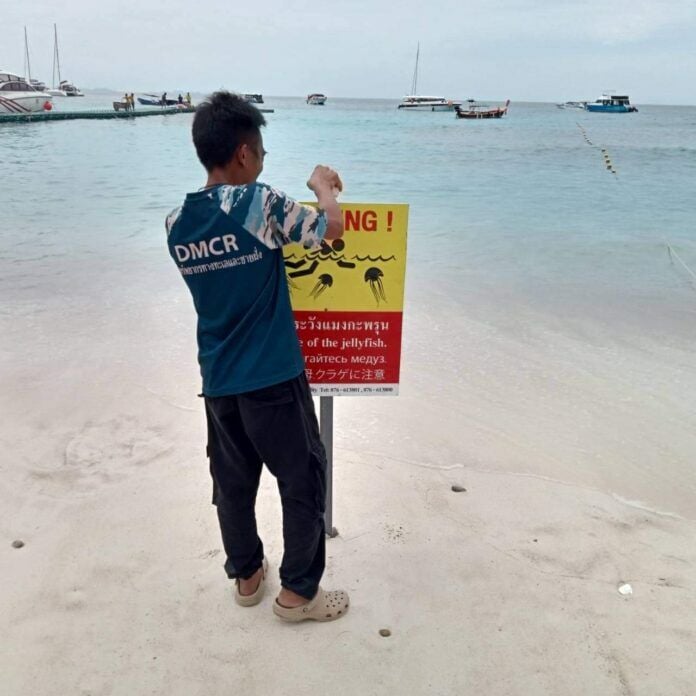Warning issued for venomous jellyfish at Phuket’s Racha Yai Island

A warning has been issued about the presence of the highly venomous Portuguese Man o’ War jellyfish in the waters of Lah Bay and Tue Bay at Racha Yai Island, Phuket.
Tourists and those engaging in marine activities in the area are advised to exercise extreme caution to avoid contact with these dangerous creatures.
The Department of Marine and Coastal Resources under the Ministry of Natural Resources and Environment issued the alert yesterday. The Portuguese Man o’ War, often mistaken for a jellyfish, is known for its potent venom. Contact with its tentacles can cause severe pain, and skin irritation, and, in extreme cases, can affect the nervous and cardiovascular systems, potentially leading to death.
The Portuguese Man o’ War is easily recognisable by its distinctive bottle-shaped float. The Marine Department emphasised the importance of avoiding any physical contact with these creatures. In the event of a sting, immediate first aid is crucial.
If stung, it is essential to use a hard object to gently remove the tentacles from the skin without using bare hands. Under no circumstances should the affected area be rubbed or any ointment applied. Vinegar should be poured continuously over the stung area for a minimum of 30 seconds to neutralise the toxins.
Freshwater should never be used to rinse the wound, as it can cause the venom to spread more rapidly. Prompt medical attention is necessary, and the victim should be taken to the hospital as quickly as possible.
Phuket is a popular destination for tourists, known for its beautiful beaches and vibrant marine life. However, the presence of the Portuguese Man o’ War poses a significant risk, and visitors are urged to heed the warning and take the necessary precautions.
Cautionary advice
One tourist, who encountered the Portuguese Man o’ War last year, shared their experience.
“I felt an intense burning sensation immediately after contact. It was unlike anything I had ever felt before, and I was lucky to receive prompt medical treatment.”
The Marine Department continues to monitor the situation closely and has increased efforts to inform the public about the dangers of these creatures. Signs have been posted in affected areas, and local businesses are also spreading the word to ensure the safety of locals and visitors.
The Ministry of Natural Resources and Environment also advises that while this species is typically found in open oceans, strong winds and currents can sometimes bring them closer to shore. This occurrence is more common during certain seasons, so staying informed about local marine conditions is vital, reported KhaoSod.
Latest Thailand News
Follow The Thaiger on Google News:


























